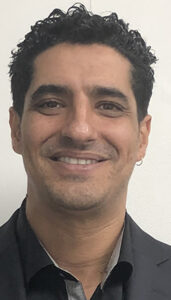By Shahar Masori

SAN DIEGO — There’s something special about growing up in Israel that’s hard to explain to people who didn’t experience it. It’s not just about the food, the language, or the landscape—it’s this quiet understanding that you’re part of the majority. Everywhere you look, people are celebrating the same holidays, preparing for Shabbat, and greeting each other with “Shana Tova” when the new year rolls around. In Israel, being Jewish isn’t something you have to explain. It’s just… understood.
I remember living in Tel Aviv in my early 20s, in Florentin, surrounded by a vibrant community of artists and musicians. We all came from different backgrounds, but there was this underlying thread that connected us. We were all part of something bigger—something that didn’t need to be stated. In Israel, being Jewish is the default, the foundation. Even when we argued about politics (which we did, constantly), we never had to explain who we were or why we were fasting on Yom Kippur.
It wasn’t until I moved to the U.S. that I really started to understand what it means to be part of a minority. Suddenly, everything I took for granted in Israel wasn’t so obvious anymore. My holidays became things I had to explain. “Oh, Hanukkah, that’s like Christmas for Jewish people, right?” someone asked me once; and after the 100th time of being asked that, I had to take a deep breath and go through the whole story of the Maccabees, the miracle of the oil, and how, no, it’s really not like Christmas at all.
In Israel, I never felt the need to explain myself. Here in the U.S., I’ve found myself becoming the spokesperson for Jewish culture, trying to bridge the gap between what I grew up with and what the people around me know—or don’t know. It’s an interesting place to be, but it can also feel heavy at times. When you’re part of the majority, you don’t really think about how much of your identity is just understood. When you’re in the minority, you become hyper-aware of it.
One moment really stands out for me. It was during Hanukkah, and my son’s school had asked parents to come in and talk about different holiday traditions. I was excited to share, but as I stood in front of the class with a menorah in my hand, I realized that for most of these kids, this was their first exposure to Hanukkah. It hit me that here, I wasn’t just celebrating my holiday—I was teaching them what it meant. In that moment, I felt the weight of being in the minority.
But here’s the thing: being in the minority has taught me things that being in the majority never could. In Israel, I didn’t have to think much about my Jewish identity—it was just part of the air I breathed. But here in the U.S., I’ve had to examine it, define it, and learn to communicate it in a way that others can understand. And through that process, I’ve come to understand it more deeply myself.
I think about this often—how different it feels to be on either side. In Israel, being Jewish feels like a shared rhythm. You don’t have to explain why the streets are empty on Yom Kippur or why there’s a national celebration when Passover starts. But here, in the U.S., being Jewish is something you carry with you a little differently. You have to be more intentional about it, more aware. You become a storyteller of your own culture.
There’s a saying I’ve always loved: “כל ישראל ערבים זה לזה”—all of Israel are responsible for one another. In Israel, that responsibility felt automatic, woven into the fabric of daily life. But in the U.S., that responsibility takes on a different meaning. Here, I feel the need to represent not just myself but the whole Jewish people, especially in spaces where I’m the only one.
It’s a strange balance—being in the majority, where your identity is never questioned, and being in the minority, where you are constantly explaining it. Both experiences have shaped me in ways I’m still coming to understand. In one place, I found comfort in being part of the whole. In another, I found strength in being the one who explains that whole to others.
So, what’s it like being in the majority versus being in the minority? It’s the difference between speaking a language that everyone around you already knows and being the one who has to teach it. Both roles come with their own challenges and rewards. And through it all, I’ve come to realize that no matter where I am, I carry my identity with me—whether it’s understood by everyone or just a few.
*
Shahar Masori was raised in Hadera, Israel, and immigrated to San Diego in 2000, where he helped build a balloon decor business and raised two sons.